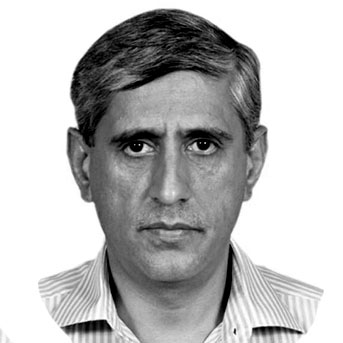Raashid Wali Janjua
TILAK Devasher has got it all wrong in his “Pakistan: The Balochistan Conundrum.” Like a typically biased Indian civil servant he has trained his guns at the Karl Marx’s concept of “Principal Contradiction” wherein the internal conflicts between the ruling Qalat elite and the nascent Pakistani political elite led towards a perpetual conflict in the largest province of Pakistan. The principal contradiction of denial of political rights of Baloch Sardars was subsequently exacerbated by a socio-economic deprivation in the province. The argument employed by Devasher however lacks depth due to its reductionist approach to the principal issue ie the gap between the Baloch expectations and the actual deprivations.
A refreshingly new perspective emerged during a seminar on Balochistan’s security and development issues at Islamabad Policy Research Institute recently. The main conclusion of the discourse by Sanaullah Baloch, one of the most vociferous advocates of Baloch rights, was the development and human security centred approach to the problems of the province. As per him the opening of political process and inclusion of all segments of Baloch social and political firmament into the democratic process had resulted in a change in the approach of Baloch nationalists like Akhtar Mengal too. The six points of Akhtar Mengal claiming Baloch rights initially had a militarized flavour as he spoke mostly about missing persons, security forces’ excesses and travails of internally displaced population. After becoming part of political process and developing stakes in governance, the same points morphed into development agenda as he started speaking about water crisis, implementation of National Action Plan and development of dams etc.
There is a need to develop a linkage between the federal and devolution imperatives of the province. The local and federal elite that according to famous theory of elite capture have captured the resources of the province need to develop empathy for people and loosen their stranglehold on local politics through inclusive structures and empowering the people. One way of doing this is through integration of geographically dispersed Baloch pockets of population. It can be done through development of roads and telecommunication connectivity. The human security and development needs of the province need to be prioritized over the security needs and not the vice versa.
The programs like the Balochistan Comprehensive Development Strategy 2013-2020 that were supported by initiatives like Aghaz-e-Haqooq Blochistan, 7th NFC Award and 18th Amendment were supposed to open up a new avenues of development but a performance audit after lapse of seven years leaves much to be desired. The new Great Game that has begun in Balochistan between USA and China with India and Afghanistan playing the role of US surrogates needs to be understood and a strategy formulated to win it. The China-Pakistan Economic Corridor (CPEC) which is the economic opportunity of the century needs to be fully capitalized upon by Pakistan keeping at bay the machinations of other stakeholders who would try every trick in their repertoire to destabilize the region through which the Corridor passes. Gwadar port that promises to emerge as another deep sea port of strategic importance for both China and Pakistan is an anathema to these extra regional powers and hence needs to be defended from their depredations. One way of doing that is to make the Baloch people the real stakeholders into the development opportunities offered by the corridor.
To achieve the above end the Federation needs to remove the sense of socio-economic deprivation and political disempowerment of the people of Balochistan. The province due to its large size is difficult to develop and the political paradox of federal government’s lack of political interest in province’s development stems from its less share in National Assembly seats that are needed to form governments at the Centre. This dilemma needs to be removed through a change in the Constitution. One way of doing this is to enhance the powers and status of Senate in being part of electing the leader of the house in National Assembly. Direct elections on Senate seats like the US Senate is also one way of achieving the desired results.
There is also an urgent need for the federal political elite and security establishment to understand the slow yet seminal changes taking place in the sociology and politics of the country due to a very large cohort of educated young urban citizens of the province. The rapidly urbanizing landscape ie 27% compared to 18% in Afghanistan is also a pointer towards a new approach to be adopted vis-a-vis Balochistan’s governance. The federal and security establishment’s propensity to privilege stability over tumult of political dissent needs to change now. The preference for docile political heads of province and a belief that since Balochistan is tribal we should sup with Sardars to the exclusion of common people is sowing dragon teeth of conflict and political deprivation.
The tribal Sardars are the symbols of the ancient regime and the future belongs to the educated middle class emerging fast due to rapid urbanization and concomitant political awareness. The old strategy, therefore, to select loyal Sardars for their political acquiescence to the centre’s diktat needs to be avoided. There is a linkage between the deterioration of security situation in Balochistan and the appeasement of the tribal Sardars. The tribal Sardars get strengthened due to the conflict in the province as the peace undercuts their nuisance power. The middle class in Balochistan is getting more politically conscious and aware of its rights. A very large number of young educated population that is expected to outnumber the old guard in next five to ten years would need a very solid expectation management form the federation, the preparation for which needs to be made right now. The state should forge links with people instead of tribal Sardars and a healthy balance needs to be established between security establishment and people’s interests. The Baloch conundrum hearkens for a human security centred solution.
— The writer, a Retired Brig, is a PhD scholar at NUST, Islamabad.









